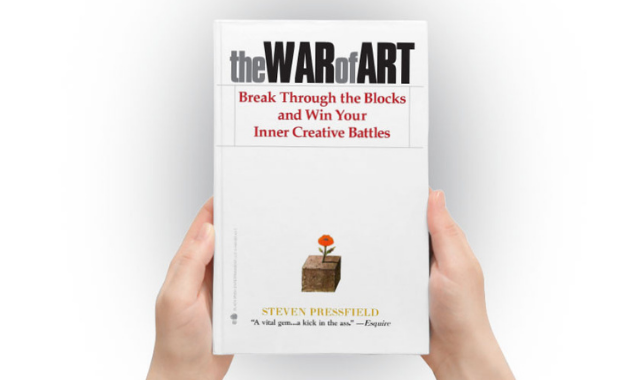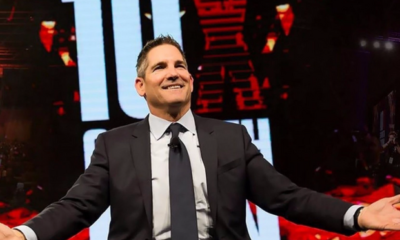Life
Life Lessons From The War of Art That Will Change Your Life

Life is chock full of both good and bad experiences. But, when times are hard, it’s, unfortunately, a natural reaction to revert into yourself as you take on the blows that life has dealt you. However, with that said, there is one simple truth that I’ve tried to stand by over the years. Instead of hiding away from the world during the tough times, always take a second to reflect on what got you to that position in the first place.
Whether you’ve made a mistake, or something has happened that you couldn’t control, you should try to be grateful all the same. When you experience these setbacks in life, it means you’ve actively made a decision to put yourself on the line – whether that’s emotionally, financially, or physically.
Believe me, you’ll sleep much better at night in the knowledge that you’ve made the decision to actively participate in life rather than watch from the sidelines as others achieve their calling. This is something that I learned early on in my entrepreneurial career from a little book called “The War of Art: Break Through the Blocks and Win Your Inner Creative Battles” by Steven Pressfield.
The author explains that the modern professional should never be under any illusion that achieving your potential is full of challenges, inequality, hardship, and lucky breaks (both good and bad).
The book is divided into three sections; the first introduces and describes the force that keeps us from achieving our calling “Resistance”; the second teaches us how to combat this invisible foe, and the third teaches us how to move past Resistance.
Here are some of the most important lessons I’ve learned from keeping this book close to hand.
1. Embrace Fear
Resistance feeds on fear. We all feel fear in the face of resistance, but so many of us just aren’t able to conquer it. Pressfield writes that fear is actually a pivotal moment in our journey; in other words, you either continue along the path you’re on, or you turn around and head for home. The more fearful you are of something, the more it means to you, and the more it has the potential to change your life.
By conquering these fears, the better and stronger you become. For example, back in 2016, an interviewer for The Verge asked the actor Tom Hiddleston why he had taken on the role of legendary country music star Hank Williams, he replied: “because it scared me.”
In most cases, the more significant a risk you take, the bigger the reward. In fact, the only real risk in life is being too afraid to take any at all.
“Our job in this life is not to shape ourselves into some ideal we imagine we ought to be, but to find out who we already are and become it.” ― Steven Pressfield
2. Live Your Best Life
Most of us lead two parallel lives: the one that we live now, and the one which we are too afraid to reach out and grasp for.
This could apply to just about any walk of life; for example, perhaps are you a budding entrepreneur crippled by fear of failure? A novelist afraid of the blank sheet of paper, or an artist who can’t pick up the brush? If you can see a life on the other side of the tracks, which you’re too afraid to live then you’re suffering from the pushback of Resistance.
Can you imagine how different our lives would be if Richard Branson hadn’t taken a leap of faith; if J.K Rowling had been too afraid to sit down and write, or if Picasso couldn’t bring himself to pick up his brushes?
3. There’s No Room For Amateurs
For one to be successful, you should approach your work in the way any professional would. This includes being punctual, dedicated, committed, and conscientious, while at the same time mastering your skills and humbly accepting the compensation received for the work.
Professionals should always strive to maintain a healthy disconnect between themselves and their chosen vocation. This means not taking yourself too seriously and learning to work well with others. Whatever it is you choose to do, by embracing this perspective, you can transform yourself from amateur to professional in no time.
4. Every Passing Second is a Missed Opportunity to Choose a Different Path
Each passing second that ticks by is another missed opportunity to make the changes you desire to create a happier and more satisfied lifestyle.
It’s this moment where you must actively beat back Resistance as it holds you back from your important work. If left to run amok, Resistance can manifest itself in the form of negative behaviors, vices, time-wasting activity, and depression and anxiety.
The book aims to train you to recognise when Resistance it’s starting to rear its ugly head so that you can beat it down at the very first opportunity.
5. Long-Term Activities Equals Resistance
In the book, the author has turned resistance into the antagonist, who’s only goal is to prevent us from experiencing the activities that feed curiosity and stir the soul. Resistance is at its most potent at the beginning of any long-term project that has the potential to change our lives.
This is when our own fear is turned against us, and as we mentioned in a previous point, fear is the defining moment – will we sink under the weight or swim against the tide?
As human beings, particularly in this day and age, we’re programmed to look for instant gratification. When we sit down to begin our long-term project, our fear that this gratification is a long way over the horizon is what sets Resistance against us.
Once you’re over that hump and you’re well on your way to your destination, that voice of Resistance begins to fade away.
“The most important thing about art is to work. Nothing else matters except sitting down every day and trying.” ― Steven Pressfield
6. Avoiding Procrastination
The most potent tool of resistance is procrastination. We are always faced with a decision when posed with a task that we are too afraid to do, but continually avoiding this task will only ever lead to complete evasion.
When you fall into the trap of procrastinating, you’re reducing your productivity and your ability to achieve your goals promptly. The book teaches us to remind ourselves that procrastination is just another side of Resistance that must be combated at all costs.
Steven Pressfield deliberately takes a stern, direct tone during his teachings in this book. Not only does he pinpoint the real reason why we are not achieving our best life, but he also shows precisely what it is we’re afraid to do. By reading, studying, and applying these simple life lessons, we have all the tools available to turn our lives into that which is both deeply fulfilling and satisfying.
Did You Know
How Skilled Migrants Are Building Successful Careers After Moving Countries
Behind every successful skilled migrant career is a mix of resilience, strategy, and navigating systems built for locals.

Moving to a new country for work is exciting, but it can also be unnerving. Skilled migrants leave behind familiar systems, networks, and support to pursue better job opportunities and a better future for their families. (more…)
Life
10 Research-Backed Steps to Create Real Change This New Year
This New Year could finally be the one where you break old patterns and create real, lasting change.

Every New Year, we make plans and set goals, but often repeat old patterns. (more…)
Life
9 Harsh Truths Every Young Man Must Face to Succeed in the Modern World
Before chasing success, every young man needs to face these 9 brutal realities shaping masculinity in the modern world.

Many young men today quietly battle depression, loneliness, and a sense of confusion about who they’re meant to be.
Some blame the lack of deep friendships or romantic relationships. Others feel lost in a digital world that often labels traditional masculinity as “toxic.”
But the truth is this: becoming a man in the modern age takes more than just surviving. It takes resilience, direction, and a willingness to grow even when no one’s watching.
Success doesn’t arrive by accident or luck. It’s built on discipline, sacrifice, and consistency.
Here are 9 harsh truths every young man should know if he wants to thrive, not just survive, in the digital age.
1. Never Use Your Illness as an Excuse
As Dr. Jordan B. Peterson often says, successful people don’t complain; they act.
Your illness, hardship, or struggle shouldn’t define your limits; it should define your motivation. Rest when you must, but always get back up and keep building your dreams. Motivation doesn’t appear magically. It comes after you take action.
Here are five key lessons I’ve learned from Dr. Peterson:
-
Learn to write clearly; clarity of thought makes you dangerous.
-
Read quality literature in your free time.
-
Nurture a strong relationship with your family.
-
Share your ideas publicly; your voice matters.
-
Become a “monster”, powerful, but disciplined enough to control it.
The best leaders and thinkers are grounded. They welcome criticism, adapt quickly, and keep moving forward no matter what.
2. You Can’t Please Everyone And That’s Okay
You don’t need a crowd of people to feel fulfilled. You need a few friends who genuinely accept you for who you are.
If your circle doesn’t bring out your best, it’s okay to walk away. Solitude can be a powerful teacher. It gives you space to understand what you truly want from life. Remember, successful men aren’t people-pleasers; they’re purpose-driven.
3. You Can Control the Process, Not the Outcome
Especially in creative work, writing, business, or content creation, you control effort, not results.
You might publish two articles a day, but you can’t dictate which one will go viral. Focus on mastery, not metrics. Many great writers toiled for years in obscurity before anyone noticed them. Rejection, criticism, and indifference are all part of the path.
The best creators focus on storytelling, not applause.
4. Rejection Is Never Personal
Rejection doesn’t mean you’re unworthy. It simply means your offer, idea, or timing didn’t align.
Every successful person has faced rejection repeatedly. What separates them is persistence and perspective. They see rejection as feedback, not failure. The faster you learn that truth, the faster you’ll grow.
5. Women Value Comfort and Security
Understanding women requires maturity and empathy.
Through books, lectures, and personal growth, I’ve learned that most women desire a man who is grounded, intelligent, confident, emotionally stable, and consistent. Some want humor, others intellect, but nearly all want to feel safe and supported.
Instead of chasing attention, work on self-improvement. Build competence and confidence, and the rest will follow naturally.
6. There’s No Such Thing as Failure, Only Lessons
A powerful lesson from Neuro-Linguistic Programming: failure only exists when you stop trying.
Every mistake brings data. Every setback builds wisdom. The most successful men aren’t fearless. They’ve simply learned to act despite fear.
Be proud of your scars. They’re proof you were brave enough to try.
7. Public Speaking Is an Art Form
Public speaking is one of the most valuable and underrated skills a man can master.
It’s not about perfection; it’s about connection. The best speakers tell stories, inspire confidence, and make people feel seen. They research deeply, speak honestly, and practice relentlessly.
If you can speak well, you can lead, sell, teach, and inspire. Start small, practice at work, in class, or even in front of a mirror, and watch your confidence skyrocket.
8. Teaching Is Leadership in Disguise
Great teachers are not just knowledgeable. They’re brave, compassionate, and disciplined.
Teaching forces you to articulate what you know, and in doing so, you master it at a deeper level. Whether you’re mentoring a peer, leading a team, or sharing insights online, teaching refines your purpose.
Lifelong learners become lifelong leaders.
9. Study Human Nature to Achieve Your Dreams
One of the toughest lessons to accept: most people are self-interested.
That’s not cynicism, it’s human nature. Understanding this helps you navigate relationships, business, and communication more effectively.
Everyone has a darker side, but successful people learn to channel theirs productively into discipline, creativity, and drive.
Psychology isn’t just theory; it’s a toolkit. Learn how people think, act, and decide, and you’ll know how to lead them, influence them, and even understand yourself better.
Final Thoughts
The digital age offers endless opportunities, but only to those who are willing to take responsibility, confront discomfort, and keep improving.
Becoming a man today means embracing the hard truths most avoid.
Because at the end of the day, success isn’t about luck. It’s about who you become when life tests you the most.
Change Your Mindset
The Four Types of Happiness: Which One Are You Living In?
Most people chase success only to find emptiness, this model reveals why true happiness lies somewhere else.

In a world driven by rapid technological growth and constant competition, many people unknowingly trade joy for achievement. (more…)
-

 Health & Fitness2 weeks ago
Health & Fitness2 weeks agoWhat Minimalism Actually Means for Your Wellness Choices
-

 News1 week ago
News1 week agoBrandon Willington Builds 7-Figure Business by Ignoring Almost Everything
-

 Did You Know2 weeks ago
Did You Know2 weeks agoWhy Most Online Courses Fail and How to Fix Them
-

 Business2 weeks ago
Business2 weeks agoIf Your Business Internet Keeps Letting You Down, Read This
-

 Business3 days ago
Business3 days agoEntrepreneur’s Guide to Pay Stubs: Why Freelancers and Small Business Owners Need a Smart Generator
-

 Business1 day ago
Business1 day agoThe Simple Security Stack Every Online Business Needs
-

 Finances1 day ago
Finances1 day agoWhy Financial Stress Is One of the Biggest Barriers to Personal Growth
-

 Scale Your Business18 hours ago
Scale Your Business18 hours ago5 Real Ways to Grow Your User Base Fast
























